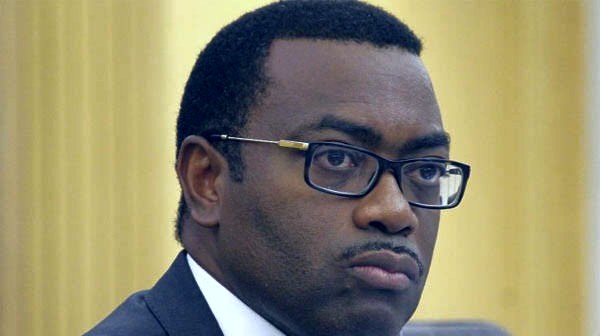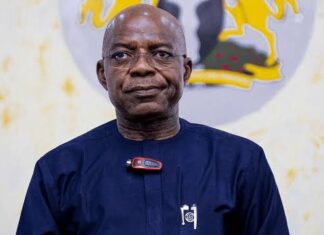By Emeka Alex Duru
The re-election bid of Nigeria’s Akinwunmi Adesina for the presidency of Africa Development Bank (AfDB) Group, is not going as smoothly as many had expected. In 2015 when he clinched the exalted post, it was with relative ease. Five years after, there are strong indications that his bid for a second term may be a tough task because of huge obstacles mounted on his way by the United States of America (USA).
The approval by the Bureau of Board of Governors of the Bank for an independent investigation of the allegations against Adesina, is a major challenge he has to overcome to retain the post. The decision, which was taken at the meeting of the Bureau on Thursday, June 4, is in deference to the demand by the U.S. government that a fresh review be conducted into the complaints against him, by whistle-blowers, using an independent investigator.
An unnamed group had in a 16-point memo, accused Adesina of impropriety and fraud, thereby violating the code of conduct of the institution. The Bureau had earlier upheld reports of the ethics committee of the Bank, headed by Takuji Yano, a Japanese Executive Director, which exonerated Adesina of all the charges and described the allegations as spurious and unfounded.
America moves against Adesina
Regardless, the United States government expressed deep reservations about the integrity of the committee’s process and called for a fresh in-depth investigation of the allegations using an independent investigator.
In a curious twist, the Bureau of Board of Governors bowed to the U.S and authorised an independent review of the ethic committee’s report. In a communiqué, the Bureau reiterated its agreement that the ethics committee of the Boards of Directors performed its role on the matter in accordance with the applicable rule. It however stressed that “based on the views of some Governors on the matter and the need to carry every Governor along in resolving it, the Bureau agrees to authorize an Independent Review of the Report of the Ethics Committee of the Boards of Directors relative to the allegations considered by the Ethics Committee and the submissions made by the President of the Bank Group thereto in the interest of due process”.
Despite the spirited attempts by the Bureau to imbue the Independent Review body with a cloak of independence, many suspect hidden hands of the US in using it to dictate who the next President of the Bank becomes. For one, the angle of an external investigator is strange to the workings of the AfDB. It is also seen as a subtle way of manipulating the affairs of the institution by vested interests and by that pushing African Regional Member Countries to the periphery.
AfDB: the mission, the vision
AfDB is a multilateral development finance institution, founded in 1964, originally by 23 African countries as regional development bank. The idea of establishing the Bank came along that of formation of the then Organisation of African Unity (OAU), currently the African Union (AU). While the draft charter of the OAU took effect in 1963 that of the AfDB came on board in 1964. OAU was tailored at achieving continental unity. The Bank aimed at addressing the development challenges of the emerging states in the continent. The AfDB comprises three entities: The African Development Bank, the African Development Fund and the Nigeria Trust Fund.
Its mission is to fight poverty and improve living conditions on the continent through promoting the investment of public and private capital in projects and programmes that are likely to contribute to the economic and social development of the Region
The inaugural meeting of the Board of Governors was held from November 4 to 7, 1964 in Lagos, while the Headquarters was opened in Abidjan, Cote d’Ivoire in March 1965. The Bank was originally an exclusive African affair till 1982 when it opened its doors to non-Africans. It now has 54 African member nations and 27 non-African member states.
Nigeria has the largest shareholding in the Bank, followed by America, Egypt and Japan. Going by the shareholding structure, Nigeria is expected to have strong voice in the affairs of the Bank. Adesina, its representative, is also deserving of another term, considering his sterling efforts at repositioning the bank.
Obasanjo rallies support for Adesina
President Olusegun Obasanjo, former President and African statesman of repute, put this into consideration in rallying 15 other leaders of the continent to back Adesina. In a move considered rare, Obasanjo maintained that Adesina has taken the bank to a great height since he took the position in the last five years. He added that the bank, under Adesina, has been actively positioned as an effective global institution ranked fourth globally in terms of transparency among 45 multilateral and bilateral institutions.
“As Africa faces COVID-19, Dr Adesina again took bold measures to ensure the bank can respond proactively to support African countries and got its board of directors to approve a $10 billion crisis response facility to support African countries,” Obasanjo said. The remark coming from a former president that is not given to sycophancy, is seen as bold endorsement on Adesina.
American Bull Dog Diplomacy at work
Analysts see in America’s insistence of another review of allegations against Adesina, a ploy to ease him out of office. This is especially given the fact that the whistle blower’s petition that the US is relying on to insist on the review has been repudiated by the internal investigative report of the bank. The fresh move is a subtle introduction of a novel structure in the affairs of the institution. A Research Fellow in the Nigerian Institute of International Affairs (NIIA), Lagos, describes the move as “America’s Bull Dog Diplomacy” at work. According to him, the insistence on review of the allegations, is the merely the first in the series of offensives lined up by the US to blackmail and scheme Adesina, Nigeria and other African countries out of relevance in the affairs of the bank. “The next stage is subtle threat on the countries backing Adesina. This may commence with severance of aids packages and denial of visas and other privileges to their officials. The ultimate goal is to take over the bank or throw up a crony that will be acting their bidding. This is American Bull Dog Diplomacy at work”, he said on condition of anonymity.
It is also seen in the unfolding succession crisis in the Bank a continuation of the battle for the soul of Africa by America and China. With increasing influence of China in the continent, America has been visibly uncomfortable. Dictating the movement of affairs in AfDB is thus seen as a strategic move at re-launching itself in the continent.
Can Nigeria withstand the pressure?
The challenge before Adesina is how far Nigeria can sustain its support for him and encourage other African states to do so. While America called for a review of the allegations against him, it took Uganda to lead the pace in mobilising support for him, with Nigeria trailing behind days after. Many likened the action to sending one on a salt market and invoking the rains on him. Again, in the face of a lukewarm foreign policy that defies precise definition, it is difficult to gauge the extent Nigeria can go in sticking her neck on Adesina’s second term bid as AfDB president. USA, with the second largest shareholding position in the bank, has interest on who heads it, an issue Nigeria should not lose sight of.











